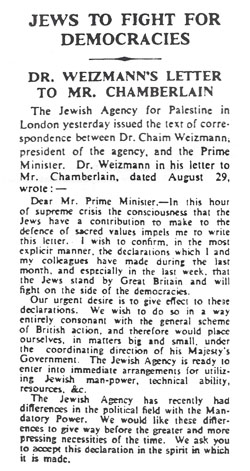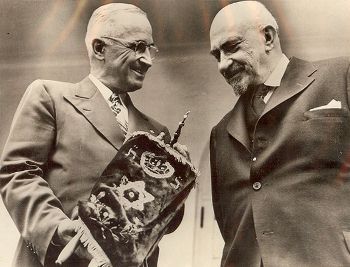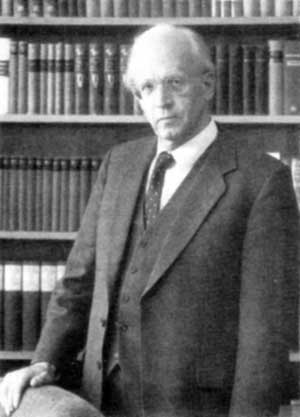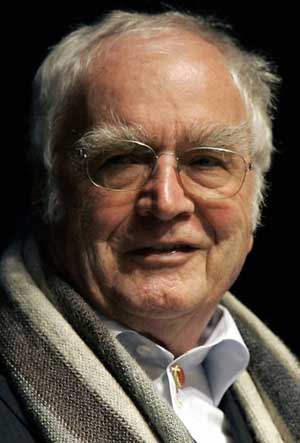Changing Perspectives on History in Germany
A Prestigious Award for Nolte: Portent of Greater Historical Objectivity?
For decades Ernst Nolte has been one of Germany’s best known historians, as well as one of the most reviled. His numerous books include “The Germans and Their Past,” “The European Civil War,” and Streitpunkte (or “Points of Contention,” reviewed in the Jan.-Feb. 1994 Journal). In the United States his best known work is probably his 1963 study, published here under title The Three Faces of Fascism, which compares “fascism” in France, Italy and Germany. Widely regarded as a path-breaking study, it remains indispensable for every serious student of the subject. After years on the faculty of the Free University in Berlin, the 77-year-old scholar is now a Professor Emeritus.
For at least two decades, his provocative views on 20th-century European history, and especially Third Reich Germany and World War II, have stimulated wide discussion about the past, even among non-historians. In a 1980 lecture entitled “Historical Legend and Revisionism?,” for example, he said:
The Third Reich should be removed from the historical isolation in which it remains… The demonization of the Third Reich is unacceptable … [Rather, it] must become an object of scholarship, of a scholarship that is not aloof from politics, but that is also not merely a handmaiden of politics …
Nolte’s detractors – especially his Jewish critics – have been particularly distressed by his suggestion that Hitler’s wartime treatment of the Jews might legitimately be regarded, at least in part, as a defensive response to the threat of Bolshevik mass murder of Germans. In his 1980 lecture, he said:
… It is hard to deny that Hitler had good reason to be convinced of his enemies’ determination to annihilate long before the first information about the events in Auschwitz became public … [Zionist leader] Chaim Weizmann’s statement in the first days of September 1939, that in this war the Jews of all the world would fight on England’s side … could lay the foundation for the thesis that Hitler would have been justified in treating the German Jews as prisoners of war (or, more precisely, as civilian internees), thus interning them.
During the 1980s Nolte was at the center of Germany’s so-called “historians’ dispute” (Historikerstreit), an intense debate about the Third Reich and World War II, and their “lessons” for the present and the future. It began with a 1986 essay by Nolte in a prestigious daily paper in which he argued that, 40 years after the end of the war, Germans should be allowed to embrace their past without a permanent sense of guilt. The two most prominent protagonists in the ensuing debate were Nolte and the leftist intellectual Jürgen Habermas. (For more on this see the interview with Nolte, and the review of his 1993 book Streitpunkte, both in the Jan.-Feb. 1994 Journal, pp. 15-22, 37-41, as well as “Auschwitz in History,” from a more recent essay by him, in the March-April 1999 Journal, p. 36.)
In a 1989 interview with an Italian newspaper, Nolte summed up his view of the phenomenon of “fascism” in Europe and of World War II:
I am convinced that European history cannot be written as the history of individual states and also not as the history of a destructive ideology which only emerged in Germany. Throughout Europe there existed a fear of Communism, and this was present even in the USA. The history of the first half of the twentieth century must therefore be written as that of a great ideological civil war in which neither of the two contending sides was entirely in the right. It was a matter of a struggle in contrasts, in propaganda, which exaggerated claims until the defeat of one party, National Socialism.

Shortly before the outbreak of war in Europe in 1939, Jewish leader Chaim Weizmann pledged that “the Jews” would “stand by” Britain in the impending fight against Germany. This historic declaration – reproduced here in facsimile – was published in the “London Times” of September 6, 1939. Weizmann was president of both the “Jewish Agency” (the Zionist “shadow government” in Palestine) and of the World Zionist Organization, and in 1949 became Israel's first president. A number of historians, including Ernst Nolte, have cited this declaration to show that Hitler had understandable grounds for treating Jews as a hostile nationality.
Expressions of hostility toward Nolte have not been merely rhetorical. In 1994 a gang of 30 leftists physically assaulted him, inflicting injuries so severe that he had to be taken to a hospital. O n another occasion terrorists set fire to his car.
Adenauer Prize
Nolte’s place in German society, where the past is always present, is thus a measure of the general social-political outlook. That’s why people took notice when he was recently honored with the “Konrad Adenauer Prize” for literature, one of Germany’s most prestigious literary awards. It was given at a ceremony on June 4, 2000, along with 10,000 marks ($4,800), by the Munich-based Germany Foundation (Deutschlandstiftung).
In his acceptance speech, Nolte showed that he has not retreated from his earlier controversial remarks. “We should leave behind the view that the opposite of National Socialist goals is always good and right,” he said. According to news reports, he again raised the question of “whether Hitler’s anti-Semitism may not have had a kernel of truth” or a “rational, comprehensible core.”
Because, he went on, Third Reich Germany was the “strongest of all counter forces” to Soviet Communism, a movement with wide Jewish support, Hitler may have had “rational” reasons for persecuting Jews. Nolte also denounced the “collective accusation” continuously leveled against Germany since 1945, and spoke out against those who advocate “an unstoppable transition toward a world civilization.” A “Jewish paradigm” of history, he said, has become more important in recent decades and now threatens to become a “quasi-religion” in which German National Socialism is regarded as a “new satan.”
Möller’s Praise for Nolte
As significant as the award itself was the speech in praise of Nolte given on the occasion of the ceremony by another prominent historian, Horst Möller, director of the renowned Institute for Contemporary History (Institut für Zeitgeschichte). The taxpayer-funded, quasi-official Institute, established in the aftermath of the Second World War, played an important role for decades in “reeducating Germans,” that is, promoting the historical perspective of the victorious western Allies. It publishes the influential historical quarterly Vierteljahreshefte für Zeitgeschichte.
While explaining that he does not agree with all of Nolte’s views, Möller praised his “life’s work of high rank,” which “has earned national and international attention.” Nolte, said Möller, is “the only philosopher of history among the German historians, and the only historian among the German philosophers of history.” It takes extraordinary courage, Möller went on, “to deviate from the main course of the current intellectual life in Germany, and to honor the historian who has been made an ‘unperson’.” Möller also spoke out against the “hate-filled and defamatory” efforts to quash open debate in Germany on 20th century history.
Möller, director since 1992 of the Munich-based Institute, has overseen an expansion of its output and impact. Also under his leadership, it played an important role in discrediting the highly-publicized “Wehrmacht Exhibition,” a traveling photo exhibit of atrocities allegedly committed by regular German armed forces during the war years. (See “Fraud Exposed in Defamatory German Exhibition,” Sept.-Dec. 1999 Journal, pp. 6-11.)
Möller’s speech, along with the award for Nolte, prompted some protests. A professor of history at Berlin’s Humboldt University, Heinrich Winkler, complained in a letter published in the influential leftist weekly Die Zeit that “Mr. Möller allowed himself to become a party to an intellectual political offensive aimed at integrating rightist and revisionist positions into the conservative mainstream.”
Jewish groups were predictably enraged by the award for Nolte. The American Jewish Congress, for example, dismissed the historian’s views as “intellectual garbage” and “old and shabby lies.” A statement by AJ Congress president Jack Rosen, issued in the aftermath of the Germany Foundation award, declared that “conservative, nationalist forces in Germany, like their counterparts in Austria, still refuse to accept the implications of the Nazi era for themselves and for their country.” As the world knows, these “implications” include uncomplaining German (and Austrian) acceptance of seemingly endless humiliations, self-abasing contrition, and reparations payments to Israel and world Jewry. (See “Germany Has Paid Out More Than $61.8 Billion in Third Reich Reparations,” Nov.-Dec. 1998 Journal, p. 19.)
The AJ Congress also condemned the “remnants of the Hitlerian impulse still present in Germany,” a reference to the sparks of resistance to the international campaign against the German nation and heritage.
Typical of the American media’s warped coverage of such matters was a tendentious New York Times report (June 21) that appeared under a headline that absurdly referred to Ernst Nolte as a “Hitler Apologist.” Similarly, a New York Times editorial (June 25) told readers that Nolte is “a well-known historian who argues for breaking taboos that have constrained Germany’s debate about the Nazi era. But some of his ideas are repugnant, and he deserves no awards.”
In reality, Nolte’s effort to dispassionately explain or understand Hitler and German National Socialism is no more an “apology” than comparable efforts by other historians to explain Napoleon, Stalin or Franklin Roosevelt, and such historical phenomena as the French Revolution, the American Civil War, or Soviet Communism.
Martin Walser’s Speech
The Nolte award ceremony is not the only sign of a greater German openness about the past. Another was an important and much-discussed speech in October 1998 by Martin Walser, one of Germany’s most prominent writers. He gave it at the Frankfurt Book Fair, the world’s largest trade exposition of book publishers, during a ceremony honoring him with the annual Peace Prize of the German Association of Publishers and Booksellers.
“Auschwitz,” said Walser, “is not suited to becoming a routine threat, a tool of intimidation that can be used any time, a moral cudgel [Moralkeule] or merely a compulsory exercise.” He lamented the “exploitation [instrumentalisierung] of our disgrace for present purposes,” an apparent reference to the seemingly endless campaign by Jewish groups for reparations.
Walser also criticized the “monumentalization of the shame,” and said that Auschwitz is exploited as a “ceaseless presentation of our shame.” The audience, which included some of the country’s most prominent cultural and political figures, rose to standing applause at the speech’s conclusion.
Even though Walser expressed himself cautiously and with considerable restraint, Jewish leaders reacted with rage bordering on hysteria. Ignatz Bubis, the influential chief of the Central Council of the Jews in Germany, called the address “intellectual arson” and complained: “I was listening to this speech and I was more and more astonished. I thought I was taking part in a neo-Nazi rally.” American newspaper comments echoed Bubis’ outrage.

A smiling President Harry Truman welcomes Zionist leader Chaim Weizmann during a White House visit, May 25, 1948. Weizmann, who “declared war” against Germany on behalf of “the Jews” in 1939, served as Israel's first president.
At least as important as the speech itself was the heated, weeks-long discussion it prompted in newspapers, magazines and television. “The trend in Walser’s speech is something that is more and more widespread of late,” Bubis said. “Intellectual nationalism is spreading, and it is not free of an understated anti-Semitism.”
A Changing Historical Perspective?
Since 1945 it has been difficult for historians, especially in Germany, to deal objectively with the Third Reich. As a writer for the London Times (June 22) recently wrote: “How far can German historians discuss Hitler in a normal way – advancing positive as well as negative elements – without seeming to be Nazi sympathizers?”
What’s behind this abnormal situation? It endures in part because, as the old saying goes, history is written by the winners. In the aftermath of World War II, the victorious Allied powers understandably sought to demonize the defeated Nazi regime. But this is only part of the answer.
Now, more than half a century after the end of the conflict, the continuing distortion of World War II history is due – as Ernst Nolte has cautiously suggested – above all, to the powerful Jewish-Zionist role in society and cultural life. Jews understandably regard Germany’s anti-Jewish Führer as one of the great villains of their collective history, along with the Egyptian Pharaoh who opposed Moses, Amalek of Torah legend, and the ancient Persian prime minister Haman. Reflecting their tremendous influence in the world today, especially in the United States, Jews have been amazingly successful in foisting a Judeocentric view of history on non-Jewish society. Thus, Hitler is portrayed as a peculiarly, even uniquely evil figure – far more so than, for example, Soviet dictator Stalin or Chinese Communist leader Mao Zedong – each of whose victims vastly outnumber Hitler’s.
A Jewish view of 20th-century history – which includes what even some Jewish intellectuals call the “Holocaust cult” or “Holocaust industry” – is obviously incompatible with a treatment that is objective and truthful.
As a result of this aberrant view of the past, Germany remains – even after half a century – a nation permanently “on parole.” Because it has already been collectively tried and convicted, so to speak, any “relapse” brings swift condemnation and threat of renewed punishment.
But as Jewish leader Bubis complained, and as the recent award to Ernst Nolte suggests, there are signs that the intellectual climate is changing. Not just in Germany, but across Europe, there is growing acknowledgement that the historical view imposed by the victorious Allies in 1945, as well as the Judeocentric view that now prevails, is a crass and even dangerous distortion. Contributing to this “historicization” has been the end of the Soviet empire, with its outpouring of new revelations about the grim legacy of Soviet Communism, and the collapse of a major pillar of the “anti-fascist” view of 20th-century history. Although powerful interests may succeed for a time in stemming the tide, in the long run a more “revisionist” treatment of history, even Third Reich history, is inevitable.
—M. W.
Thanks
We've stirred up things a lot since the first issue of the Journal of Historical Review came out in the spring of 1980 – 20 years ago. Without the staunch support of you, our subscribers, it couldn't have survived. So please keep sending those clippings, the helpful and critical comments on our work, the informative articles, and the extra boost over and above the subscription price. It's our life blood. To everyone who has helped keep the Journal alive, our sincerest thanks.
Bibliographic information about this document: The Journal of Historical Review, vol. 19, no. 4 (July/August 2000), pp. 29-32
Other contributors to this document: n/a
Editor’s comments: n/a


